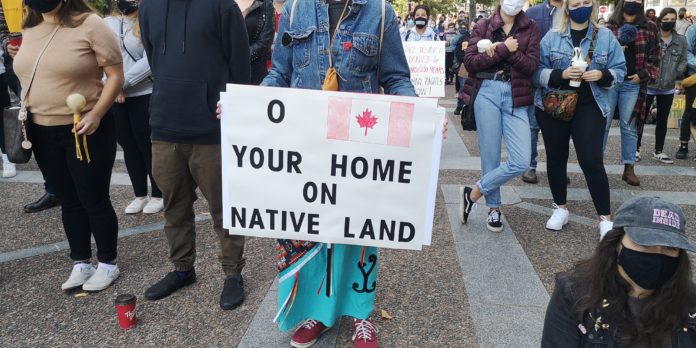
For Tanner Augustine, a St. Thomas University Mi’kmaq student from Elsipogtog First Nation, the current conflict between commercial and Indigenous fishermen in St. Marys Bay, Nova Scotia, hits close to home.
Since late August, tensions have arisen between commercial and Indigenous fishermen in regards to lobster fishing. Treaty 1752 grants Indigenous Peoples the right to fish lobster for livelihood out of the regular season, but some commercial fishermen are against it, according to CBC News.
Augustine’s brother is a fisherman who, in the past, has suffered sabotage, threats and theft of equipment, he said. The second-year student is worried about his brother’s safety since he fishes in New Brunswick and N.S. for lobster to make a living and gives lobster to his family. He said it has nothing to do with commercial success.
“If it was for commercial success, he would live a little better,” he said.
Exercising treaty rights
On Sept.17, the Sipekne’katik Frist Nation launched its own Mi’kmaq-regulated, rights-based lobster fishery in St. Marys Bay, which is believed to be the first of its kind in N.S., CBC News said.
But some commercial fishermen say the Sipekne’katik First Nations’ fishery is illegal, said CBC News. On Sept. 20, commercial fishermen removed 350 lobster traps that belonged to Mi’kmaq fishermen.
Megan Bailey, an associate professor at Dalhousie University and Canada Research Chair in Integrated Ocean and Coastal Governance, said Mi’kmaq people have a right to food, social, ceremonial and livelihood fishing under the Peace and Friendship Treaties.
In 1999, the Supreme Court of Canada ruled under the Marshall decision that Indigenous Peoples have a right to earn a moderate livelihood from fishing.
“Donald Marshall Jr. was arrested for fishing eels and selling them without a license. The Supreme Court found that he has treaty rights and that all Mi’kmaq have treaty rights,” said Bailey.
Augustine said the commercial fishermen are upset because of the Indigenous fishermen fishing out of season even though treaty 1752 makes this legal.
The commercial fishermen don’t see the Mi’kmaq as fishing for livelihood and believe they will see a cut in their profits due to the Mi’kmaq fishing offseason, said Augustine.
He said he’s heard commercial fishermen say “we’re just protesting fishing, that’s it.”
“But it’s not a peaceful protest if you do intimidation and fear tactics,” he said.
STU student Leanne Hudson, who is Mi’kmaq and from Annapolis Royal, N.S., said this is the first major protest she has seen in her lifetime.
But from her personal connections back home in the Annapolis Valley, she is aware of the discrimination Indigenous fishermen face.
“It’s not uncommon for fishers or boats that are Indigenous-run, with Indigenous fishers on them to just have some issues with gear or damage and things like that,” said the second-year communications major.
Shannonbrooke Murphy, the endowed chair of human rights at STU, said the Mi’kmaq are exercising their treaty rights and human rights that are protected under the Canadian Constitution.
Murphy said the situation has arisen due to the inaction and negligence of the Department of Fisheries and Oceans and Bernadette Jordan, the minister of fisheries, oceans and the Canadian Coastguard.
“And indeed, the federal government, they’ve had more than two decades to sort out the regulatory framework in conjunction with the Mi’kmaq,” she said.
Murphy said it’s in the hands of the DFO and the minister to explain to the commercial fishermen the regulations that come with treaty fishing for the Mi’kmaq and why it doesn’t apply to commercial fishing. She hopes those explanations would ease the concerns commercial fisherman may have.
From a human rights perspective, Murphy said the commercial fishermen have a right to hold and express their opinions, protest, create petitions and access the information on the treaties. But these rights don’t allow the commercial fishermen to impose on others exercising their human rights.
“They have no right to impose a blockade, they have no right to sabotage or otherwise damage or remove the Mi’kmaq vessels or lines or traps,” she said.
“And most definitely, they do not have the right to engage in and anti Indigenous harassment, or threats of violence.”
The Aquinian reached out to Colin Sproul, president of the Bay of Fundy Inshore Fishermen’s Association, but received no comment.
Bailey said to de-escalate the situation, ministers on a provincial and federal level as well as Indigenous leaders need to have a conversation with commercial fishermen.
“Commercial fishery really needs to understand the right that is present,” said the Dalhousie professor.
“They do not have a right to be on the water cutting traps and ramming boats.”
Augustine said it would be frustrating and disheartening if the government decides to ignore this situation because this could affect Indigenous Peoples exercising other treaty rights.
“This situation is being used as a rallying cry among the Mi’kmaq reserves.”
